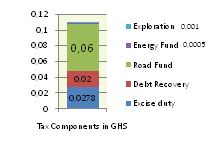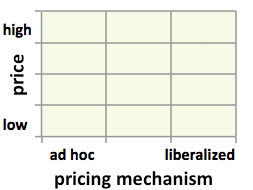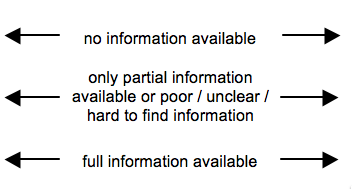Difference between revisions of "Fuel Prices Ghana"
***** (***** | *****) m (Text replace - "Fuel Price Exchanre Rate Date" to "Fuel Price Exchange Rate Date") |
***** (***** | *****) m (1 revision) |
Revision as of 17:35, 2 December 2012
Part of: GIZ International Fuel Price database
Also see: Ghana Energy Situation
Fuel Pricing Policies
| Local Currency: | GHS |
| Exchange Rate: | 1.4183
|
| Last Update: |
The National Petroleum Authority (NPA) regulates fuel prices in Ghana by setting indicative maximum prices. The NPA is an autonomous and independent regulatory authority, consisting of representatives of the economy, the politics and the consuming public. The NPA offers comprehensive information on fuel price composition on their webpage.
Until Dec 2010, prices had remained unchanged for 14 months (→Annex A1). The refinery prices were frozen, even in times of rising crude oil prices on the world market in 2010. In early January 2011, a considerable hike in fuel prices of 25-30% was announced. According to the NPA (see →Annex A1), this step was necessary due to rising crude oil prices. However, also some tax elements were increased (e.g. debt levy) as well as the retailer margin.
The debt recovery levy is used to retire considerable debts of the state-owned refinery. Those debts accumulated immensely over time, from the discrepancy between frozen selling prices and rising crude oil prices. Since 2006, there is a pricing mechanism forcing the re-calculation of fuel prices whenever this discrepancy exceeds 2.5%. Therefore it is unclear how prices could soar instantaneously by 30% in Jan 2011 after 14 months of unchanged prices, instead of being increased gradually over several months. Has the formula been ignored during these 14 months period?
The Uniform Petroleum Price Fund (UPPF) Levy is used to offer uniform fuel prices across the country, in spite of deviating transportation costs (→ see 2.), i.e., the UPPF finances the transportation to rural areas. A self-financing cross-subsidy among several fuels is used to lower prices for fuel types mainly consumed by the poor (e.g. gas oil, kerosene and premixed fuel, which is mainly used by fishermen).
→Some info taken from “Fuel Pricing in Ghana” by Charles Amoaty (GTZ 2006)
Fuel Prices and Trends
| Gasoline 95 Octane | Diesel | |
|---|---|---|
| in USD* |
|
|
| in Local Currency |
|
|
* benchmark lines: green=US price; grey=price in Spain; red=price of Crude Oil
Fuel Price Composition
Price composition for one litre of Gasoline 95 Octane as of 2010/10/01.


Source: http://www.npa.gov.gh/petroleum-prices/ ; (see → Annex A2 for October 2010 values)
(* Unified Petroleum Price Fund: Supports fuel transportation to rural regions while maintaining a countrywide uniform pump price; the goal is to ensure the supply in all regions.)
(** Subsidy across fuels: This value is only positive for gasoline and negative for all other fuels, i.e., the consumption of all other fuels is subsidized by the consumption of gasoline (the idea is to subsidize fuels mainly consumed by the poor))
At a Glance
| Regulation-Price-Matrix |
| ||||
 |

|

|

| ||
ad-hoc-style pricing in 2010/Jan. 2011?
Statements are missing, when and why prices are re-calculated (why frozen prices for 14 months, followed by a 30% price hike?)
Sources to the Public
| Type of Information | Web-Link / Source |
|---|---|
| Price Composition | http://www.npa.gov.gh/petroleum-prices/ |
| Pump prices and margins | http://www.npa.gov.gh/ |
| Pump prices and margins | http://www.npa.gov.gh/petroleum-prices/ |
Contact
Please find more information on GIZ International Fuel Price Database and http://www.giz.de/fuelprices



















